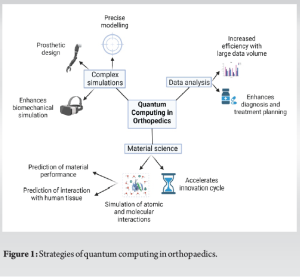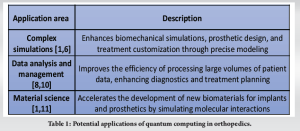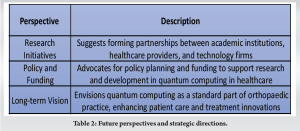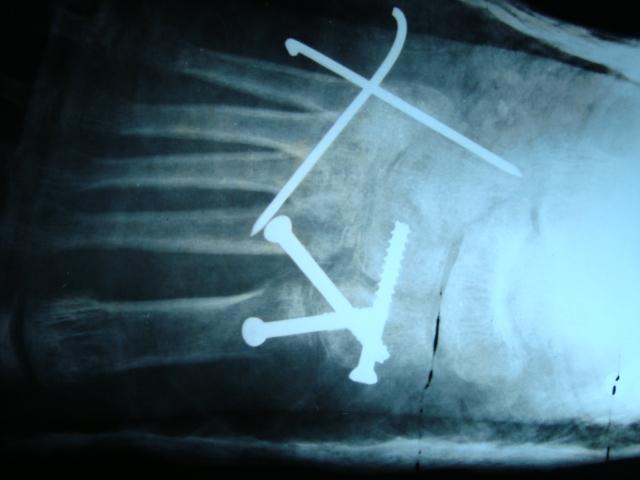Quantum computing has the potential to transform orthopedics by enhancing biomechanical simulations, improving data analysis, and innovating in material science, although it faces significant technical and ethical challenges
Dr. Madhan Jeyaraman, Department of Orthopaedics, ACS Medical College and Hospital, Dr. MGR Educational and Research Institute, Chennai - 600077, Tamil Nadu, India. E-mail: madhanjeyaraman@gmail.com
Quantum computing represents a significant paradigm shift in our approach to processing information by leveraging the enigmatic principles of quantum mechanics. This cutting-edge technology is designed to perform computational tasks at exponentially higher speeds compared to classical computing, offering potential breakthroughs in fields as diverse as cryptography, financial modeling, and scientific research [1]. In the realm of scientific research, particularly, quantum computing promises to transform the capabilities for complex data analysis and modeling, crucial for advancements in various disciplines [2]. In the domain of orthopedics, the integration of advanced technologies has historically centered around enhancing diagnostic accuracy, surgical precision, and overall patient outcomes. This integration primarily involves conventional computing technologies such as sophisticated imaging systems, robotic-assisted surgery, and comprehensive data management systems. These technologies, while foundational, are inherently limited by the computational constraints of classical systems [3]. Despite these advancements, the orthopedic field has yet to fully harness the transformative potential of quantum computing. The aim of this editorial is to explore and advocate for the integration of quantum computing within the field of orthopedics. It speculates on how quantum-enhanced algorithms could revolutionize biomolecular modeling, complex simulations of biomechanical systems, and the personalization of medical treatments. These advancements could significantly improve patient care and treatment outcomes by overcoming the current limitations faced by conventional computing, particularly in managing and analyzing large-scale datasets and performing intricate simulations required in orthopedic research and practice [1]. This editorial underscores the urgent need for a shift towards quantum technologies to foster significant advancements in orthopedics.
Complex simulations
Quantum computing has the potential to revolutionize biomechanical simulations within orthopedics by providing unparalleled computational power and accuracy. Traditional simulations are often constrained by the computational limits of classical systems, making them less capable of handling the intricacies of human biomechanics and interactions between tissues and orthopedic devices. Quantum computing can address these challenges by simulating complex physical phenomena at a quantum level, thus offering highly accurate predictions of mechanical stress and tissue response under various conditions [4]. This can greatly enhance prosthetic design and customization, enabling the personalization of treatments that are precisely tailored to individual patient needs. Furthermore, the quantum approach can simulate surgical outcomes in virtual environments, providing surgeons with valuable pre-operative insights [1,5].
Data analysis and management
The vast amounts of data generated in orthopedic care, from detailed imaging to patient biometrics, pose significant challenges in terms of processing and analysis. Quantum computing can transform data analysis and management through its capability to process large datasets rapidly and with high precision. Quantum algorithms are particularly effective in pattern recognition and can be used to enhance diagnostic accuracy, optimize treatment plans, and predict surgical outcomes more effectively [6,7]. By employing quantum-enhanced data analysis, orthopedic practitioners can achieve a more integrated and efficient approach to patient care, potentially reducing the time and cost associated with traditional diagnostic processes [8].
Material science
In the field of material science, quantum computing offers exciting possibilities for the development and testing of new biomaterials for orthopedic applications. By simulating atomic and molecular interactions, quantum computers allow for the exploration of material properties and behaviors at an unprecedented scale, which is crucial for developing new implants and prosthetic devices. These simulations can predict how materials will interact with human tissue, their durability, and their overall performance within the body. This capacity for advanced simulation can accelerate the innovation cycle, from material design to clinical testing, ensuring that new materials are both effective and safe for patient use. The insights gained from quantum simulations can lead to the development of materials that are not only more compatible with human biology but also more durable and responsive to the mechanical demands of body movement [1,9]. The strategies of quantum computing in orthopedics are depicted in Fig. 1 and Table 1.

Technical and financial barriers
Quantum computing, while promising, is currently encumbered by significant technical and financial barriers that could impede its integration into orthopedics. One of the primary technical challenges is the requirement for quantum computers to operate in extremely controlled environmental conditions, such as near-zero temperatures, to maintain quantum coherence [9]. This necessity presents a significant hurdle in terms of both the infrastructure and the on-going operational costs associated with maintaining such environments. In addition, the high costs of developing and acquiring quantum computing technology make it a less viable option for many healthcare institutions, particularly those in resource-limited settings [1]. Another substantial barrier is the scarcity of skilled quantum programmers and researchers who understand both the complexities of quantum mechanics and its application in biomedical contexts, which is crucial for developing and implementing orthopedic solutions [12].
Ethical and security issues
The advent of quantum computing raises profound ethical concerns, particularly in relation to the security and privacy of patient data. Quantum computing has the potential to break many of the cryptographic protocols currently safeguarding digital information, including medical records [6]. This vulnerability could expose sensitive patient information, leading to privacy violations and potential misuse of personal health data. Ethical considerations also extend to the equitable access to quantum computing technologies in healthcare, ensuring that advancements do not disproportionately benefit wealthier institutions or regions, thereby widening existing disparities in health-care quality and access [10].
Integration into clinical practice
Integrating quantum computing into clinical practice poses substantial challenges, given the current infrastructure of health-care systems which are primarily designed around classical computing technologies. Updating these systems to accommodate quantum computing will require significant capital investment and logistical planning [7]. Furthermore, there is a notable gap in the training and readiness of medical professionals to utilize such advanced technology. Developing educational programs and continuous learning opportunities for clinicians to become proficient in using quantum-based technologies is crucial for their successful adoption [13, 14]. The shift to quantum computing in clinical settings also demands careful consideration of how these technologies will interface with existing medical devices and IT systems, ensuring compatibility and uninterrupted care during the transition period [5]. Addressing these challenges requires a coordinated effort between technologists, health-care providers, and policymakers to ensure that the deployment of quantum computing in orthopedics is both technologically viable and ethically sound.
Future perspectives
To harness the full capabilities of quantum computing in orthopedics, concerted research initiatives involving collaborations between academic institutions, health-care providers, and technology firms are crucial. These partnerships can leverage the theoretical expertise of academia, the practical insights of healthcare professionals, and the technological innovations from industry leaders. For instance, joint ventures could focus on developing quantum algorithms specific to biomechanical simulations or personalized medicine applications in orthopedics. Academic institutions could also establish dedicated centers for quantum biomedical research, acting as hubs for knowledge exchange and innovation [7, 8]. Advocating for robust policy frameworks and dedicated funding is vital to support the research and development of quantum computing in orthopedics [15]. Governments and international health organizations should consider creating grant programs specifically aimed at quantum health innovations [16]. Policymakers need to establish standards and regulations that address the unique challenges of quantum computing, such as data security and the ethical use of technology in medical practice. In addition, incentives for private sector investment can accelerate the development and implementation of quantum technologies in health-care settings [1, 9]. The long-term vision for quantum computing in orthopedics includes its integration as a standard part of medical practice, where quantum-driven diagnostics, treatment planning, and personalized medicine become the norm. Envision a future where quantum simulations predict the outcomes of surgical interventions with high precision, and quantum-enhanced materials science leads to the development of next-generation implants tailored to individual biochemistry and biomechanics. This future will not only enhance the effectiveness of treatments but also significantly improve patient outcomes and satisfaction, marking a new era in orthopedic care [3, 11]. By setting a strategic focus on these areas, the orthopedic community can lead a quantum leap forward in medical technology, transforming patient care through ground-breaking innovations Table 2.
Quantum computing holds the remarkable potential to revolutionize orthopedics through advanced biomechanical simulations, enhanced data management, and innovative material sciences. These applications promise to refine diagnostics, personalize treatments, and develop superior biomaterials, ultimately improving patient outcomes. However, this potential comes with significant challenges, including technical and financial barriers, ethical concerns about data security, and the integration of such advanced technology into current medical practices. As we stand on the brink of this technological frontier, it is imperative for orthopedic professionals, researchers, and policymakers to actively participate in shaping the future of quantum computing in healthcare. By investing in research initiatives, crafting supportive policies, and fostering collaborations between academia, healthcare, and industry, the orthopedic community can unlock the transformative power of quantum computing. Embracing quantum computing not only enhances the capabilities of orthopedic practice but also positions it at the forefront of medical technology innovation. Let us move forward with the resolve to turn these possibilities into realities, paving the way for a new era in healthcare that is more precise, personalized, and impactful.
Embracing quantum computing in orthopedics could significantly advance patient care through improved diagnostics, personalized treatments, and innovative implant materials, necessitating careful navigation of its technical and ethical complexities.
References
- 1.Tarasov PA, Isaev EA, Grigoriev AA, Morgunov AF. The utilization of perspective quantum technologies in biomedicine. J Phys Conf Ser 2020;1439:012040. [Google Scholar]
- 2.Solenov D, Brieler J, Scherrer JF. The potential of quantum computing and machine learning to advance clinical research and change the practice of medicine. Mo Med 2018;115:463-7. [Google Scholar]
- 3.Padalhin A, Chung PS, Woo SH. Quantum technology: A beacon of light for next-generation healthcare. Med Lasers 2023;12:212-9. [Google Scholar]
- 4.Marella ST, Parisa HS. Introduction to quantum computing. In: Quantum Computing and Communications. London, UK: IntechOpen; 2020. [Google Scholar]
- 5.Flöther FF. The state of quantum computing applications in health and medicine. Res Dir Quantum Technol 2023;1:1-21. [Google Scholar]
- 6.Ur Rasool R, Ahmad HF, Rafique W, Qayyum A, Qadir J, Anwar Z. Quantum computing for healthcare: A review. Future Internet 2023;15:94. [Google Scholar]
- 7.Shams M, Choudhari J, Reyes K, Prentzas S, Gapizov A, Shehryar A, et al. The quantum-medical nexus: Understanding the impact of quantum technologies on healthcare. Cureus 2023;15:e48077. [Google Scholar]
- 8.Arshad MW, Murtza I, Arshad MA. Applications of quantum computing in health sector. J Data Sci Intell Syst 2023;1:19-24. [Google Scholar]
- 9.Dhande C, Bagchi P. Quantum computing in healthcare and medicines. In: Somashekhar R, Bagchi P, Jawalkar KS, Dhanalakshmi G, Hill R, Harke SN, editors. Proceedings of the International Conference on Advances in Nano-Neuro-Bio-Quantum (ICAN 2023). Atlantis Press International BV: Dordrecht; 2023. p. 267-76. [Google Scholar]
- 10.Almotiri SH, Nadeem M, Ghamdi MA, Khan RA. Analytic review of healthcare software by using quantum computing security techniques. Int J Fuzzy Logic Intell Syst 2023;23:336-52. [Google Scholar]
- 11.Maheshwari D, Garcia-Zapirain B, Sierra-Sosa D. Quantum machine learning applications in the biomedical domain: A systematic review. IEEE Access 2022;10:80463-84. [Google Scholar]
- 12.Giang V. Quantum computing and its applications in healthcare. Our J ODU Undergraduate Res J 2023;10:5. [Google Scholar]
- 13.Khan T. Challenges and Opportunities in Quantum Technology Education. AZO Quantum. Available from: https://https://www.azoquantum.com/article.aspx?articleid=493 [Last accessed on 2024 Apr 17]. [Google Scholar]
- 14.How ML, Cheah SM. Forging the future: Strategic approaches to quantum ai integration for industry transformation. AI 2024;5:290-323. [Google Scholar]
- 15.Ukpabi D, Karjaluoto H, Bötticher A, Nikiforova A, Petrescu D, Schindler P, et al. Framework for understanding quantum computing use cases from a multidisciplinary perspective and future research directions. Futures 2023;154:103277. [Google Scholar]
- 16.Van Daalen O. Developing a human rights compatible governance framework for quantum computing. Res Dir Quantum Technol 2024;2:e1. [Google Scholar]









